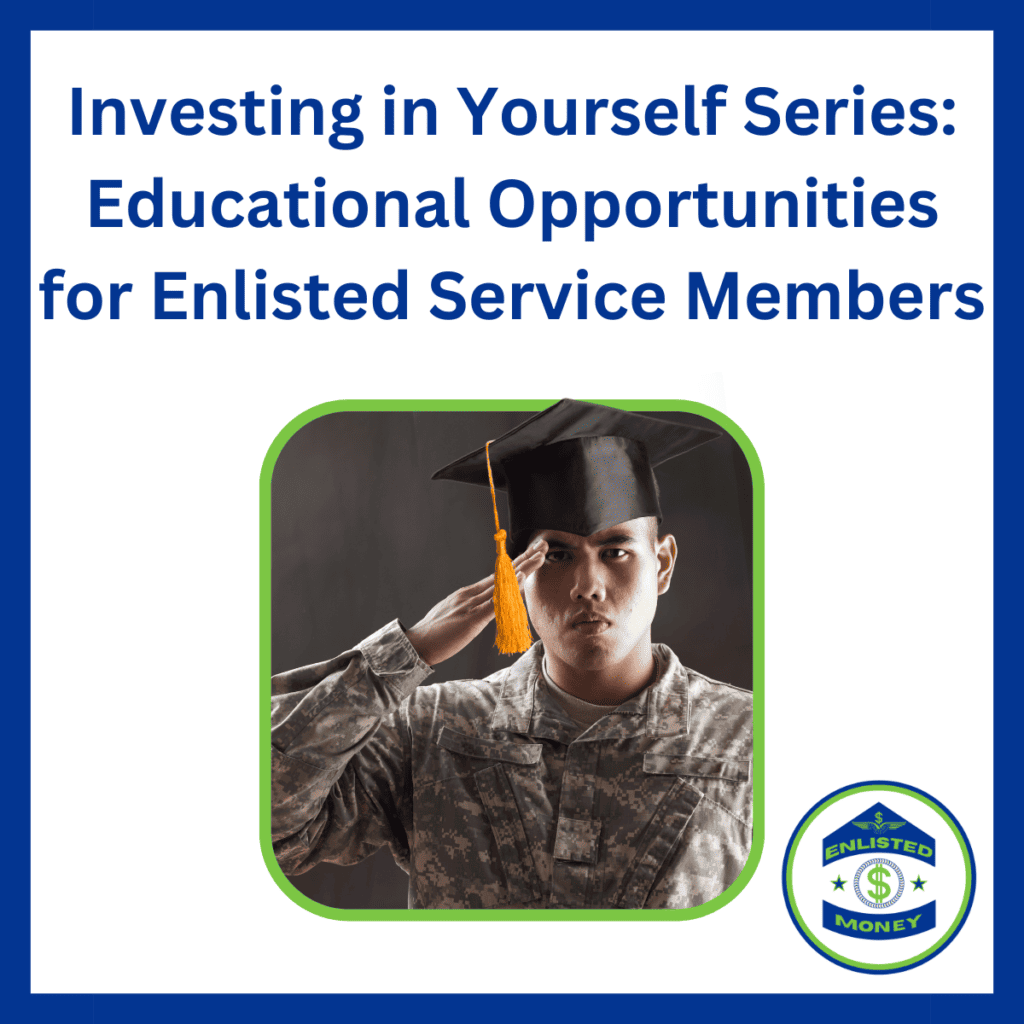
Investing in yourself is one of the most overlooked, yet critically important areas to invest your time and money. As enlisted service members, we’re given a lot of opportunities to improve ourselves both inside and outside the military.
There’s so much to cover here, so I’m splitting this topic into three parts: Education, Military Training and Experiences, and Personal Growth. For this article I’m going to focus on educational opportunities to further your current career and earning potential after service.
Education and Skill Development
I’ve always been surprised at how many Soldiers join with the goal of getting college paid for, yet don’t maximize those benefits. I’ve heard excuses from not knowing what degree to pursue to not having time. It’s pretty ironic that the thing that’s supposed to provide a college education (the military) can end up distracting us from that very thing we wanted in the first place.
I personally joined the Army so I wouldn’t have to go to college. Surprise! The military wants you to go to college to get promoted.
However, I’m very glad I got started early on and eventually got my associate degree, then bachelor degree, and now I’ve completed another certification program on top of that. Actually, I don’t really see a time where I won’t be trying to learn something new.
Higher Education and Career Advancement
It’s a shame younger service members don’t spend more time on college. When you’re first starting out, you have a lot more time than you think – at least compared to later on. Once I had a team I was in charge of as an NCO, I had less and less time.
This is also one area where your initial efforts have outsized impacts on your career and education journey. Once you get a few credit hours, you can usually get your Joint Services Transcript (JST) evaluated and get additional course credit.
For me, I ended up with 28 credit hours just for taking 2 classes. This meant a huge bump in my promotion points early on. I’ve known people who waited several years, struggled to get points, then spent a little time and got their JST evaluated to get their last few points to get promoted. I highly suggest getting your JST evaluated right away.
Actually, another thing to note, once you’ve been in awhile, get your JST reevaluated. That’s how I got my last credits for my bachelor’s degree. My training as a recruiter gave me the final speech credits I needed.
All the services do things a little differently, so get with your education center and find a buddy who’s cranking out college to get the most up to date info.
Utilizing Military Education Benefits
Another excuse I hear is that the school someone wants to go to doesn’t take tuition assistance (TA) or they can’t do the program they want online. So what? I think you should at least get your associates in something if this is the case. Every year you’re not using TA, you’re wasting money.
I also know most services don’t allow you to use TA right way. That’s okay, you don’t need TA right off the bat. Sign up for college and fill out the FAFSA. I’d all but guarantee you’ll get a lot of your tuition covered.
CLEP Tests
Another benefit to get you your degree faster is through the College-Level Examination Program® (CLEP). You can take these tests for free as a service member. I actually took two of these tests without studying at all and passed.
Not all CLEP tests will count toward your degree, so you’ll have to ask your specific school if they accept CLEP tests and which ones count toward your degree.
Finish an Associate Degree in Your First Enlistment
I think every service member should try to finish their first enlistment with an associate degree. This is very attainable – especially if you’re in a fairly technical field. This will help you decide what you do and don’t like, help you get promoted, and open up some opportunities. For example, my current actually requires at least an associate degree.
The other thing this does is help open up some opportunities within the military too. If you want to become a warrant officer or commissioned officer, having some college may be helpful. At a minimum, it shows you’re willing to put in the extra effort to make yourself better.
Don’t Like “Traditional” College?
Many people complain about wanting to do a trade program or something with less books. I started college for welding, took a break after I PCSed, took a small engine repair course, switched to criminal justice, then switched to general studies – all before I finished my associate degree.
Don’t wait around for the right opportunity to come up. I just picked things that sounded interesting and went with it. Keep in mind, there’s a limit to how much TA you can get, but it’s still pretty generous.
Earn a Credential or Certification
There are several other “non-college” options available. Check out the DOD Credentialing Opportunities On-Line (COOL) website for your service’s portal. The Army now has the Credentialing Assistance program as well. (If your service has something like this, please let me know so I can include it here).
I actually earned the Network+ certification and my Chartered Financial Consultant – ChFC® designation while on active duty too. I’ve got a wide variety of educational experiences, but I use each of them from time to time.
Pick an Education Opportunity and Get Started Investing in Yourself
At the end of the day, there’s really no reason for you not to pursue higher education. Even if you’re not in a technical job, having some college or additional credentials will help you inside and outside the military. There is a time commitment, but if you take it easy and just do one class at a time, you’ll be okay.
I’ve never taken more than one class at a time or more than four classes per year. I’m incredibly thankful that the Army forced me to take college to get promoted. It’s opened up so many opportunities I didn’t even know I wanted at the time.
So go pick something and get started!
